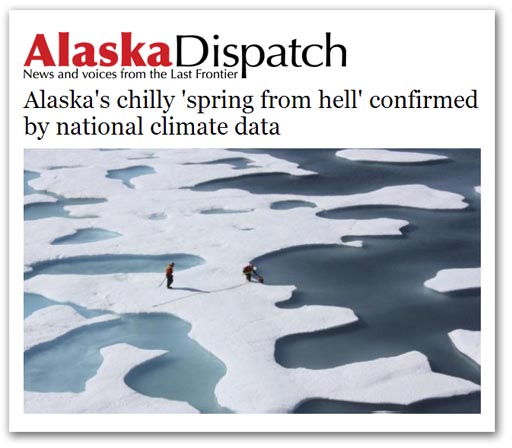12/06/2013
Temperatures over central Alaska have been 4 to 5ºC colder than usual, making this one of the coldest springs on record for cities like Fairbanks, reports the
Alaska Despatch, using NSIDC data.
The low temperatures have been linked to slack winds over central Alaska that have resulted in very little mixing to get rid of the cold air. Subsequently, Alaska's Bering, Chukchi and Beaufort seas have remained largely locked in ice.
Yet, on the Atlantic side of the Arctic Ocean, the ice has thawed at a faster-than normal rate so far in 2013, while on the Pacific side, including the waters of eastern Siberia, things are a little behind schedule. Thus, while we get
record fishing in the Barents Sea, in Alaska they get the "spring from hell".
Closer to home, last year we were inundated by rain, with the "summer that never was". This year, after untypically late snow, we are enjoying something close to summer, while Germany and Hungary get the floods.
But, as a possible harbinger,
New Zealand is looking forward to a bumper winter with plenty of early-season snow, while some regions have been hit with heavy snowfalls and bitter conditions.
And then, for all the hyperventilation about ice loss, Arctic sea ice extent
declined at a near-average rate through May, but overall it remained below average compared with the 1979 to 2000 average.
May 2013, horror of horrors, was the
tenth lowest May for ice cover in the satellite record, coming in at 390,000 square kilometres above the record low of 12.81 million sq km in 2011. Through the month of May this year, extent declined at an average rate of 36,400 sq km per day, slower than the 1979 to 2000 average of 44,100 sq km per day.
So, if you can make any sense out of that, you are very brave. Some might venture that it's climate change. But then, doesn't climate always change?
COMMENT THREAD

